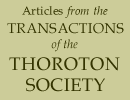
Shire Hall, c.1870.
Sir Thomas Parkyns was a real old English worthy. It was said of him that he was equally at home in the wrestling ring or on the magistrates' bench, that he could throw an antagonist, combat a paradox, quote the classics, and lay down the law with any in England.
Evidently at this Rufford meeting he was a keen opponent of the Nottingham proposal to remove the County Hall from the High Pavement to the Market Place. He tells us that "the proceedings were rapid. Some readily signed the resolved Order before us, whilst others at length were prevailed upon to follow their example," and he goes on to say:—"I appeared to be the only single Ten that refused to set my hand to that plough lest my reasons should have obliged me to look back to the thwarting of the proverb."
His reasons are set forth in a printed document published by him. There are two copies of this document in Nottingham that can be seen, one in the Belper Library at the Shire Hall, and the other in the Bromley House Library. It is a quaint and humorous document.
It is described by the author as—
"Queries and Reasons offer'd by Sir Thomas Parkyns of Bunny, Bart. Why the County Hall, Gaol &c. should be built in the County of Nottingham and on the new purchas'd ground for that very purpose, and not in the Market Place of the Town and County of the Town of Nottingham and out of the County at large. And why he could not join with his Brethren the Justices of the Peace in signing the Order of Sessions at Rufford, April 24th, 1724."
It is dedicated :—
| "To the most Noble Evelyn Duke of Kingston. | |
| Thomas Duke of Newcastle, Lord Lieutenant and Custos Rot. for the County of Middlesex, Westminster and Nottingham &c. | |
| William Duke of Devonshire, Lord Lieu: Derby. | |
| John Duke of Rutland, Lord Lieu: Leicester. | |
| The Right Hon: Philip Earl of Chesterfield. |
|
| Thomas Earl of Strafford. | |
| William Lord Byron. | |
| Thomas Lord Middleton. | |
| Scroope Lord Visc: Howe | our present members |
| Sir Robert Sutton | of Parlt. |
| and to all Justices of the Peace and other gentlemen of the County of Nottingham the Freeholders and Terre Tenants of the same." |
Sir Thomas states "that he hath ever studyd the general good of the County of Nottingham. Next to it he hath had the benefit and welfare of the Town and County of the Town of Nottingham much at heart," and he suggests that his reasons may be "thought natural and free, not proceeding from any sinster motive, or induc'd thro' self interest, but meerly flowing from an earnest desire to do the best service he can, as well for the County, as for the Town and Corporation of Nottingham, as having therein neither Lands nor Houses, but ever strenous of serving, and never slipping any opportunity of shewing and expressing his willingness and readiness to oblige them to the best of his Power."
He objected to the erection of the County Hall in the "spacious and well adorn'd Market Place," and he considered it would "streighten spoil and lessen the fine and unparalleled Market Place."
To do this he considered would be to the corporation's great prejudice. He refers to the "gentlemen's, Gentlemen Traders' Houses and Publick Inns," and says that there is "scarce sufficient room now for entertaining the great concourse of people to that Market," and for "accommodating such as deal with the merchants and other Shopkeepers all the rest of the week through the Navigable and Beneficial River of Trent."
He asks whether a great influx of the County to the Town "on Market Days especially at an Assize time when the greatest part of the gentlemen in the County and freeholders are called together on the Grand and other Juries not to say one word of the innumerable Evidences" (witnesses) "on some Tryals," would not call for a "large addition of publick houses in and near the Market and Double Hall."
He gives arguments in favour of the High Pavement site, and, incidentally, of the undesirability of the Market Place site.
He considered "the Judges would much rather chuse to lie in the open free and wholesome airy part of the Town as now" (i.e., on the High Pavement), where they have, on the one hand, the prospect of "The Duke of Kingstons Holme Pierepoint with those ancient gardens yet much in fashion, and Mr. Musters House at Colwick and useful modern gardens; " and on the other hand " The Duke of Newcastles well furnished Castle with Lord Middletons Woollaton Hall;" and, in a direct and straight line in their view, "the pleasant flowery and fragrant meadows and the situation of fine Clifton with those elegant gardens."
He refers to the nearness to the High Pavement of St. Mary's large church, "fit to receive a congregation at an Assize Sermon. When the Sermon is no sooner over but the Judges step out of the Church into our Courts of Judicature."
Another reason given was the difficulty of conducting and carrying prisoners from the gaol to the hall at so great a distance without running great hazards of many escapes and rescues by their friends and accomplices, and he points out the advantage of the hall and gaol being near together.
Apparently the proposed hall in the Market Place was to be built on pillars, with space for the Market underneath, for Sir Thomas says there would be "twenty steps to labour up to the top of the Columns." At the High Pavement hall there would be not more than half a dozen steps to ascend.
